

Nominalizations Are Zombie Nouns. Draft is a series about the art and craft of writing.

Take an adjective (implacable) or a verb (calibrate) or even another noun (crony) and add a suffix like ity, tion or ism. You’ve created a new noun: implacability, calibration, cronyism. Sounds impressive, right? Nouns formed from other parts of speech are called nominalizations. Academics love them; so do lawyers, bureaucrats and business writers. Exquisite corpse. An exquisite corpse Exquisite corpse, also known as exquisite cadaver (from the original French term cadavre exquis) or rotating corpse, is a method by which a collection of words or images is collectively assembled.
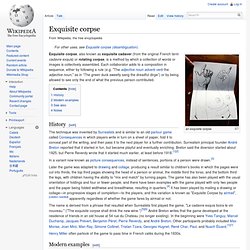
Each collaborator adds to a composition in sequence, either by following a rule (e.g. "The adjective noun adverb verb the adjective noun," as in “The green duck sweetly sang the dreadful dirge”) or by being allowed to see only the end of what the previous person contributed. History[edit] Guide to Literary and Critical Theory. Paragraphs and Topic Sentences. LitWeb - The Norton Introduction to Literature: W. W. Norton & Company StudySpace. When it comes to the study of literature, reading and writing are closely inter-related—even mutually dependent—activities.
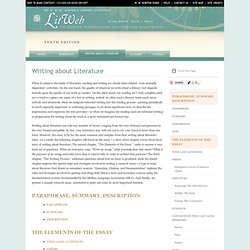
On the one hand, the quality of whatever we write about a literary text depends entirely upon the quality of our work as readers. On the other hand, our reading isn’t truly complete until we’ve tried to capture our sense of a text in writing. LitWeb - The Norton Introduction to Literature: W. W. Norton & Company StudySpace. W.

Winston Churchill's Way With Words. Hide captionWinston Churchill wrote every word of his many speeches — he said he'd spend an hour working on a single minute of a speech. Above, he is shown speaking during the 1945 election campaign. Express/Getty Images Winston Churchill is best remembered as the British prime minister whose speeches rallied a nation under a relentless Nazi onslaught in World War II.
But few people know that he won the Nobel Prize in Literature — in part for his mastery of speechmaking. hide captionThough he went on to win the Nobel Prize in Literature, Churchill didn't always excel in school. EasyBib: Free Bibliography Maker - MLA, APA, Chicago citation styles.
Reading& writing about poetry. Writing About Literature: Explicating a Poem and Symbolism. English Language Arts: Writing Prompts/Journal Topics. Grammar. How to Use Commonly Misused Words. Steps Method 1 of 17: "Affect" and "Effect" 1Use “effect” as instructed.
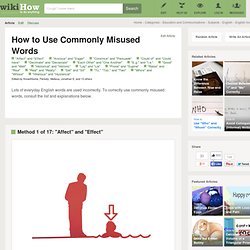
"Effect" is a noun referring to something that happens as a result of something else. E.g., "The antibiotic had little effect on the illness. ""Effect" is also a verb meaning to bring something about. 2Use “affect” as instructed.The verb "affect" means to change something in some way. This Itch of Writing: But can you teach Creative Writing? I get asked this amazingly often, considering that no one ever asks if you can teach the doing of other arts, but, just as I took ages to get on to that other old chestnut, "What is literary fiction?

" and my own personal Ancestral Elephant, it's taken me till now to sort out what I think clearly enough to answer the question. My answer, mind you, depends on how long I've got, but it comes from someone who wrote for fifteen years before being taught, (and my thoughts on the pros and cons of writing courses are here) but now teaches, and knows hundreds of writers who have been taught, and hundreds who haven't been taught, and not a few who teach: 1) Yes. 2) Yes, you can teach it, just as you can teach painting or sculpture, or choreography or writing music. What can Diane Arbus teach you about writing? I always thought of photography as a naughty thing to do - that was one of my favorite things about it, and when I first did it, I felt very perverse. -- Diane Arbus Diane Arbus (1923-1971) was an American photographer and a student of human diversity, often described as a "photographer of freaks.
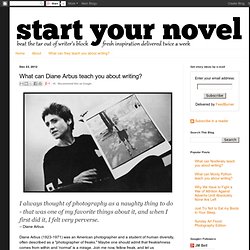
" Maybe one should admit that freakishness comes from within and 'normal' is a mirage. Join me now, fellow freak, and let us contemplate the normalness of strangehood. Why “Show, Don’t Tell” Is the Great Lie of Writing Workshops. I’m honored and excited today to be bringing you a guest post by critically acclaimed novelist and writing instructor Joshua Henkin.

I first discovered Henkin’s work years ago when I received an advance copy of his novel Matrimony at Book Expo America, and I later enjoyed having him contribute a thought-provoking essay on the art of storytelling to Writer’s Digest magazine (in fact, two of his writing tips from that piece made our Top 20 Writing Lessons From WD list in 2009). HOW TO WRITE GOOD. Caveat emptor.
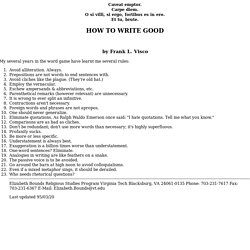
Carpe diem. O si villi, si ergo, fortibus es in ero. Et tu, brute. by Frank L. Visco My several years in the word game have learnt me several rules: Avoid alliteration. Neil Gaiman's 8 Rules of Writing. By Maria Popova In the winter of 2010, inspired by Elmore Leonard’s 10 rules of writing published in The New York Times nearly a decade earlier, The Guardian reached out to some of today’s most celebrated authors and asked them to each offer his or her commandments.
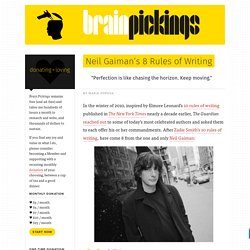
After Zadie Smith’s 10 rules of writing, here come 8 from the one and only Neil Gaiman: WritePut one word after another. Find the right word, put it down.Finish what you’re writing. Whatever you have to do to finish it, finish it.Put it aside.